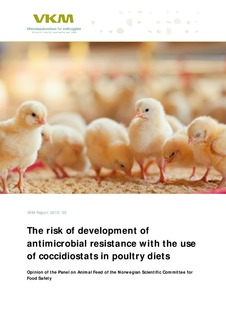The risk of development of antimicrobial resistance with the use of coccidiostats in poultry diets. Opinion of the Panel on Animal Feed of the Norwegian Scientific Committee for Food Safety
Nesse, Live Lingaas; Bakke, Anne Marie; Eggen, Trine; Hoel, Kristian; Kaldhusdal, Magne; Ringø, Einar; Yazdankhah, Siamak Pour; Lock, Erik-Jan; Olsen, Rolf Erik; Ørnsrud, Robin; Krogdahl, Åshild
Research report
Published version
Permanent lenke
http://hdl.handle.net/11250/2463088Utgivelsesdato
2015Metadata
Vis full innførselSamlinger
- Institutt for biologi [2571]
- Publikasjoner fra CRIStin - NTNU [38047]
Sammendrag
Antimicrobials revolutionized human as well as animal medicine in the 20th century by providing effective treatment of diseases caused by pathogenic microorganisms. However, microorganisms have the ability to develop antimicrobial resistant strains. This occurs when microorganisms mutate or when resistance genes are exchanged between them. The use of antimicrobial drugs accelerates the emergence of drug-resistant strains. A priority is to safeguard the efficacy of antimicrobial drugs we depend on for treatment of infectious diseases in humans. Use of antimicrobials in food animals can create a source of antimicrobial resistant bacteria that can spread to humans both by direct contact and through the food supply.
Coccidiosis is an intestinal disease in animals caused by unicellular parasites called coccidia. As most of the damage of this infection is done by the time signs of the disease are widespread, preventive measures are preferred. Coccidiostats are animal feed additives used to prevent coccidiosis by inhibiting or killing coccidia. There are two major groups of coccidiostats; ionophores and non-ionophores, the latter also referred to as “non-ionophore coccidiostats” (but also called chemicals). One main difference between these groups is that ionophores also inhibit or kill some bacterial species, whereas non-ionophore coccidiostats do not. Consequently, some bacterial infections may also be controlled by ionophore coccidiostats, e.g. the poultry disease necrotic enteritis caused by the bacterium Clostridium perfringens (C. perfringens).
Eleven different coccidiostats have been authorised for use in the EU, both ionophores and non-ionophore coccidiostats. Norway has been exempted from the EEA Agreement in this field and has approved only five; all ionophores. The two ionophore coccidiostats currently used in Norway are narasin for broilers and monensin for turkeys.
